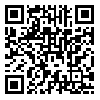Volume 7, Issue 4 (winter 2020)
J Prevent Med 2020, 7(4): 55-48 |
Back to browse issues page
Download citation:
BibTeX | RIS | EndNote | Medlars | ProCite | Reference Manager | RefWorks
Send citation to:



BibTeX | RIS | EndNote | Medlars | ProCite | Reference Manager | RefWorks
Send citation to:
Nabilpour M, Aghababa A, Afroundeh R. The implicit and explicit attitudes of male athlete students toward performance-enhancing substances. J Prevent Med 2020; 7 (4) :55-48
URL: http://jpm.hums.ac.ir/article-1-479-en.html
URL: http://jpm.hums.ac.ir/article-1-479-en.html
The implicit and explicit attitudes of male athlete students toward performance-enhancing substances
1- Department of Sport Physiology, Faculty of Psychology and Educational Sciences, Mohaghegh Ardabili University, Ardabil, Iran.
2- Department of Sport Psychology, Institute of Physical Education and Sport Sciences, Tehran, Iran.
3- Department of Sports Physiology, Faculty of Educational Sciences and Psychology, Mohaghegh Ardabili University, Ardabil, Iran.
2- Department of Sport Psychology, Institute of Physical Education and Sport Sciences, Tehran, Iran.
3- Department of Sports Physiology, Faculty of Educational Sciences and Psychology, Mohaghegh Ardabili University, Ardabil, Iran.
Abstract: (3444 Views)
Introduction: Nowdays athletes use performance-enhancing substances (any type of nutritional, physical, mechanical, psychological, or pharmacological action) for a variety of reasons, including increasing their ability to perform physical activity and improve performance. The main reason for using these substances is attributed to the positive attitude towards them. These substances are categorized into authorized and unauthorized substances. The aim of this study was to investigate the implicit and explicit attitudes of Iranian male athlete students toward performance-enhancing substances.
Methods: This research was of descriptive-analytical type. The statistical population were athelete students in the Tehran province. A total of 64 subjects were selected based on the available sampling method. To test the students' attitudes, a standard doping-based image test was used. Data analysis was performed using SPSS version 20 software.
Results: The results showed that athlete students had a positive attitude towards dietary supplements in both explicit and implicit attitudes. However, they had a negative explicit attitude towards doping but a positive implicit attitude toward it (p- value <0.05). There was also a significant difference between the students' implicit and explicit attitudes toward doping (p- value <0.05). But there was no difference in implicit and explicit attitudes towards permitted dietary supplements.
Conclusion The use of implicit attitudes can be considered as a new approach in preventing doping and its side effects among professional and even non-professional athletes.
Methods: This research was of descriptive-analytical type. The statistical population were athelete students in the Tehran province. A total of 64 subjects were selected based on the available sampling method. To test the students' attitudes, a standard doping-based image test was used. Data analysis was performed using SPSS version 20 software.
Results: The results showed that athlete students had a positive attitude towards dietary supplements in both explicit and implicit attitudes. However, they had a negative explicit attitude towards doping but a positive implicit attitude toward it (p- value <0.05). There was also a significant difference between the students' implicit and explicit attitudes toward doping (p- value <0.05). But there was no difference in implicit and explicit attitudes towards permitted dietary supplements.
Conclusion The use of implicit attitudes can be considered as a new approach in preventing doping and its side effects among professional and even non-professional athletes.
Type of Study: Orginal |
Subject:
Special
Received: 2020/10/18 | Accepted: 2020/12/5 | Published: 2021/02/28
Received: 2020/10/18 | Accepted: 2020/12/5 | Published: 2021/02/28
Send email to the article author
| Rights and permissions | |
 |
This work is licensed under a Creative Commons Attribution-NonCommercial 4.0 International License. |







 hums.ac.ir
hums.ac.ir